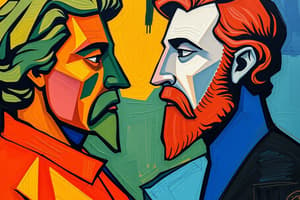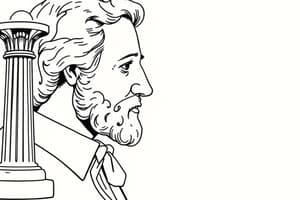Podcast
Questions and Answers
Who is considered the creator of liberalism?
Who is considered the creator of liberalism?
- John Locke (correct)
- Adam Smith
- Montesquieu
- Thomas Jefferson
John Locke believed in the divine right of kings.
John Locke believed in the divine right of kings.
False (B)
What did John Locke believe should replace absolutism in government?
What did John Locke believe should replace absolutism in government?
Rule of law
Montesquieu believed the best government would balance power among three branches: executive, legislative, and ___ .
Montesquieu believed the best government would balance power among three branches: executive, legislative, and ___ .
Who is known as the father of capitalism?
Who is known as the father of capitalism?
According to Adam Smith, what is the purpose of government?
According to Adam Smith, what is the purpose of government?
The Agricultural Revolution decreased the population due to improved farming methods.
The Agricultural Revolution decreased the population due to improved farming methods.
What does the Renaissance emphasize?
What does the Renaissance emphasize?
The era known as the Age of Reason emphasizes reason and individualism, which is referred to as the ___ .
The era known as the Age of Reason emphasizes reason and individualism, which is referred to as the ___ .
What are the core values of classical liberalism? Select all that apply.
What are the core values of classical liberalism? Select all that apply.
What is collective norms?
What is collective norms?
Flashcards are hidden until you start studying
Study Notes
Key Figures in Classical Liberalism
- John Locke established classical liberalism. Emphasized natural rights and the social contract.
- Locke argued for a government based on the consent of the governed, protecting life, liberty, and property.
- He opposed absolutism and divine right, advocating for rational and reasonable governance, and supported revolutions against tyranny.
- Montesquieu championed the separation of powers into executive, legislative, and judicial branches to prevent tyranny.
- He promoted checks and balances, allowing citizen involvement in law-making and governance.
Influential Thinkers
- Thomas Jefferson, a founding father, authored the Declaration of Independence and served as the third President of the United States.
- Adam Smith, known as the father of capitalism, advocated for Laissez-Faire economics, emphasizing minimal government role in the economy.
- Smith's "Invisible Hand" theory suggested that individual self-interest leads to collective well-being, opposing mercantilism.
Historical Contexts
- The Agricultural Revolution led to improved farming techniques, increasing population and demand for goods.
- The Renaissance, or "rebirth," focused on education, art, and critical thinking, fostering cultural growth.
- The Enlightenment (1650s-1780s) emphasized reason and individualism, laying the intellectual foundation for liberalism.
- The Industrial Revolution represented the economic basis for liberalism through technological and industrial advancements.
Political Concepts
- Absolute monarchy features a single ruler with unrestricted political power over the state.
- Authoritarianism is characterized by indefinite political tenure, often seen in single-party states.
- Capitalism is an economic system marked by private ownership of production and profit-driven motives.
Constitutional Principles
- The Charter of Rights and Freedoms is part of Canada’s Constitution Act of 1982, serving as a bill of rights.
Core Values of Classical Liberalism
- Primary values include liberty, individualism, skepticism towards power, rule of law, and civil society.
- Advocates for spontaneous order, free markets, tolerance, peace, and limited government intervention.
Societal Theories
- Collective norms are culturally established rules that dictate appropriate behavior.
- Collectivism approaches social organization by prioritizing the group's needs over individual interests.
Studying That Suits You
Use AI to generate personalized quizzes and flashcards to suit your learning preferences.




